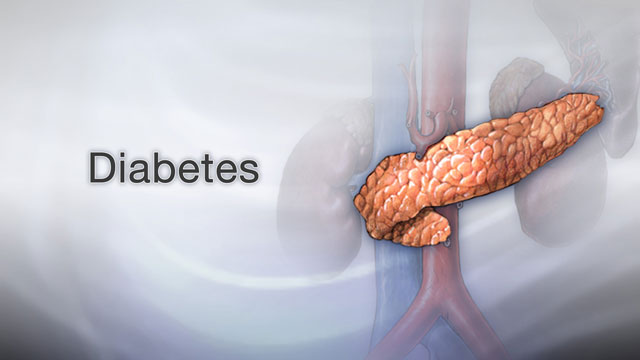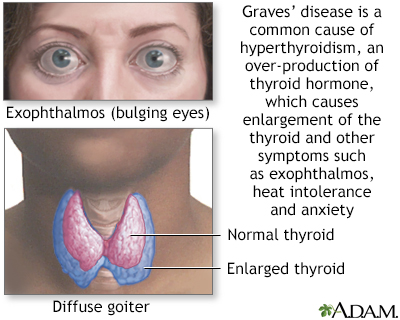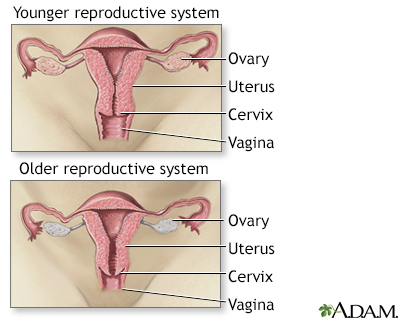Heat intolerance
Heat intolerance is a feeling of being overheated when the temperature around you rises. It can often cause heavy sweating.
Heat intolerance usually comes on slowly and lasts for a long time, but it may also occur quickly and be due to a serious illness.
Causes
Heat intolerance may be caused by different factors:
Some types of medicines may make you less tolerant to heat. Not all medicines will affect everyone the same. If you have questions about any medicines you take, contact your health care provider. The types of medicines that may increase your risk of heat intolerance include:
- Antihistamines
- Amphetamines or other stimulants, including those found in drugs that suppress your appetite
- Antibiotics
- Antidepressants
- Antipsychotic medicines
- Blood pressure medicines
- Cholesterol medicines (statins)
- Decongestants
- Diabetes medicines
- Overactive bladder medicines
- Pain relievers (non-steroidal anti-inflammatories, also called NSAIDs)
- Parkinson disease medicines
Certain health conditions may make you less tolerant to heat. This can be due to the condition itself or any medicine you may take to manage it:
- Cystic fibrosis
- Diabetes
- Cardiovascular disease
- Graves disease
- Mental health conditions
- Multiple sclerosis
- Obesity
- Too much thyroid hormone (thyrotoxicosis)
Thyrotoxicosis
Hyperthyroidism is a condition in which the thyroid gland makes too much thyroid hormone. The condition is often called overactive thyroid.
 ImageRead Article Now Book Mark Article
ImageRead Article Now Book Mark Article
Other issues and conditions can make you more likely to have heat intolerance. These include:
- Alcohol use
- Bacterial or viral infection
- Having had heat exhaustion or heat stroke before
- Illegal drug use (opioids, cocaine, methamphetamines)
- Lack of physical fitness
-
Menopause
Menopause
Menopause is the time in a woman's life when her periods (menstruation) stop. Most often, it is a natural, normal body change that occurs between ag...
 ImageRead Article Now Book Mark Article
ImageRead Article Now Book Mark Article - Pregnancy
Age can also be a factor. Young children and older adults are less able to adjust to temperature extremes. Older adults are also more likely to be taking medicine that increases the risk for heat intolerance.
Home Care
Exposure to extreme heat and sun can cause heat emergencies or illnesses. You can prevent heat illnesses by:
Heat emergencies or illnesses
Heat emergencies or illnesses are caused by exposure to extreme heat or sun. Heat illnesses can be prevented by being careful in hot, humid weather....

- Drinking plenty of fluids
- Keeping inside room temperatures at a comfortable level
- Limiting how much time you spend outdoors in hot, humid weather
When to Contact a Medical Professional
Contact your provider if you have unexplained heat intolerance.
What to Expect at Your Office Visit
Your provider will take a medical history and perform a physical examination.
Physical examination
During a physical examination, a health care provider checks your body to determine if you do or do not have a physical problem. A physical examinati...

Your provider may ask you questions like these:
- When do your symptoms occur?
- Have you had heat intolerance before?
- Is it worse when you exercise?
- Do you have vision changes?
- Are you dizzy or fainting?
- Do you have sweating or flushing?
- Do you have numbness or weakness?
- Is your heart beating fast, or do you have a rapid pulse?
- Are there any medicines or drugs that may be involved?
Tests that may be performed include:
- Blood studies
- Thyroid studies (TSH, T3, free T4)
TSH
A TSH test measures the amount of thyroid stimulating hormone (TSH) in your blood. TSH is produced by the pituitary gland. It prompts the thyroid g...
 ImageRead Article Now Book Mark Article
ImageRead Article Now Book Mark ArticleT3
Triiodothyronine (T3) is a thyroid hormone. It plays an important role in the body's control of metabolism (the many processes that control the rate...
 ImageRead Article Now Book Mark Article
ImageRead Article Now Book Mark ArticleT4
T4 (thyroxine) is the main hormone produced by the thyroid gland. A laboratory test can be done to measure the amount of free T4 in your blood. Fre...
 ImageRead Article Now Book Mark Article
ImageRead Article Now Book Mark Article
Reviewed By
Frank D. Brodkey, MD, FCCM, Associate Professor, Section of Pulmonary and Critical Care Medicine, University of Wisconsin School of Medicine and Public Health, Madison, WI. Also reviewed by David C. Dugdale, MD, Medical Director, Brenda Conaway, Editorial Director, and the A.D.A.M. Editorial team.
Hollenberg A, Wiersinga WM. Hyperthyroid disorders. In: Melmed S, Auchus RJ, Goldfine AB, Koenig RJ, Rosen CJ, eds. Williams Textbook of Endocrinology. 14th ed. Philadelphia, PA: Elsevier; 2020:chap 12.
Pearce EN, Hollenberg AN. Thyroid. In: Goldman L, Cooney KA, eds. Goldman-Cecil Medicine. 27th ed. Philadelphia, PA: Elsevier; 2024:chap 207.
Sawka MN, O'Connor FG. Disorders due to heat and cold. In: Goldman L, Cooney KA, eds. Goldman-Cecil Medicine. 27th ed. Philadelphia, PA: Elsevier; 2024:chap 95.
Disclaimer





 All rights reserved.
All rights reserved.